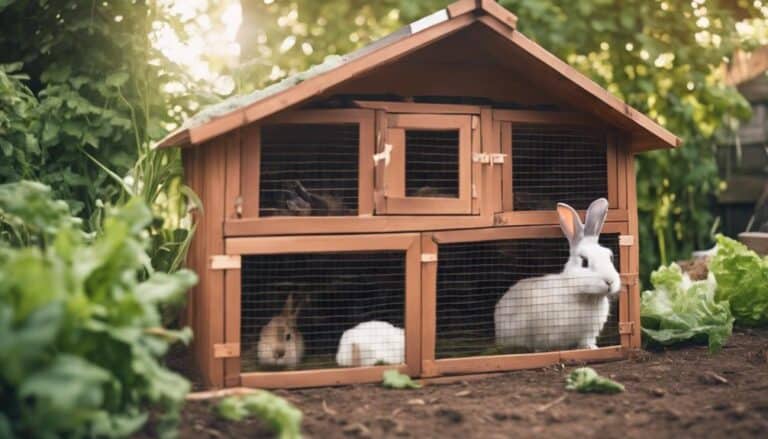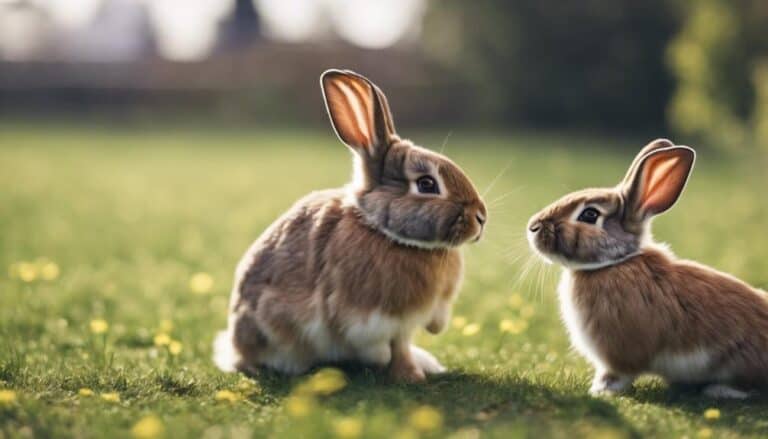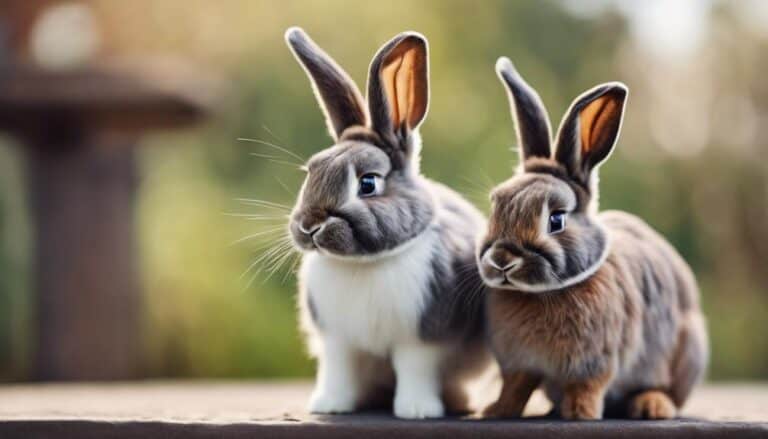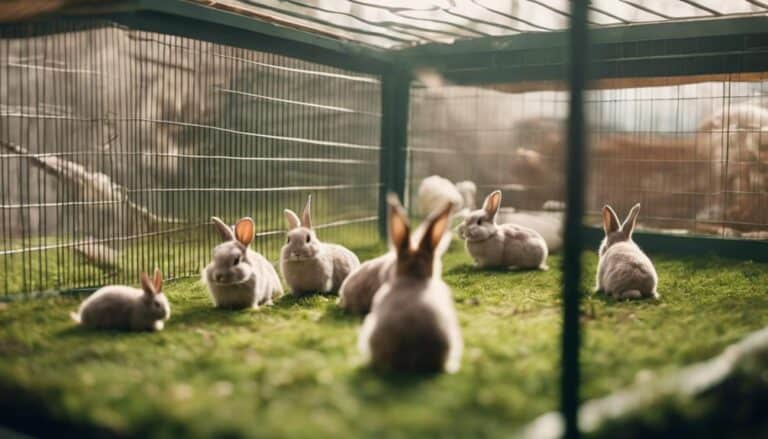Imagine a serene garden where fluffy bunnies hop freely under the warm sun.
Curious about the mysterious process of bunny reproduction? Discovering the duration of a bunny's gestation period can offer insights into the fascinating world of rabbit breeding.
How long do these adorable creatures carry their young, and what factors influence this important period of their lives?
Let's unravel the secrets behind the bunny gestation period to deepen our understanding of these beloved furry companions.
Contents
Key Takeaways
- Bunny gestation typically lasts 31-33 days, crucial for rabbit health.
- Signs of pregnancy include nesting behavior and physical changes.
- Proper care during pregnancy involves providing a warm, clean, and secure environment.
- Managing bunny reproduction includes preventing unwanted litters through neutering and responsible breeding practices.
Bunny Gestation Period Overview
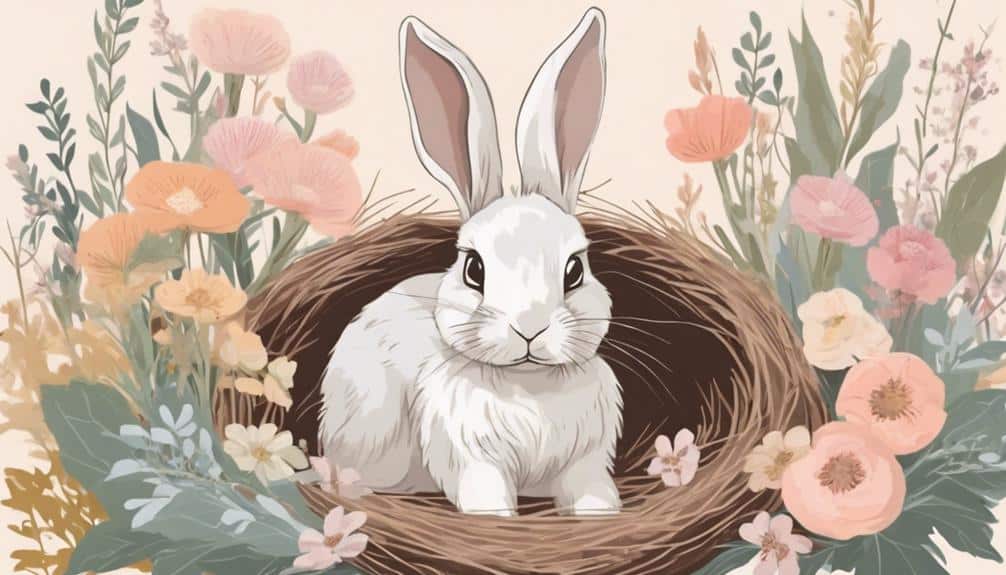
The bunny gestation period, a critical aspect of rabbit reproduction, typically spans 31-33 days. Female rabbits are capable of getting pregnant as early as 12 weeks old. This means that once a female rabbit reaches around three months of age, she can potentially conceive and carry offspring for about a month before giving birth.
Male rabbits, on the other hand, can start mating as early as four months old. It's important to be aware of these timelines when caring for rabbits, especially if you have both male and female rabbits in the same living environment.
Understanding the gestation period is vital for ensuring the health and well-being of both the pregnant rabbit and her potential offspring. By being knowledgeable about the reproductive cycle of rabbits, you can better prepare for the responsibilities that come with rabbit breeding and care.
Determining Bunny Pregnancy
Entering the domain of determining bunny pregnancy involves observing specific signs and behaviors exhibited by the female rabbit. To help you navigate this essential aspect of rabbit care, consider the following emotional cues:
- Anticipation: The excitement of potentially welcoming a new litter can be both thrilling and nerve-wracking as you wait to confirm if your female rabbit is pregnant.
- Concern: Worries about false pregnancies or unwanted breeding can arise, emphasizing the importance of accurate detection methods.
- Preparation: Setting up a nest box and ensuring proper care for a pregnant rabbit requires careful planning and dedication to guarantee a safe and comfortable environment for both the mother and her offspring.
Signs of Bunny Pregnancy
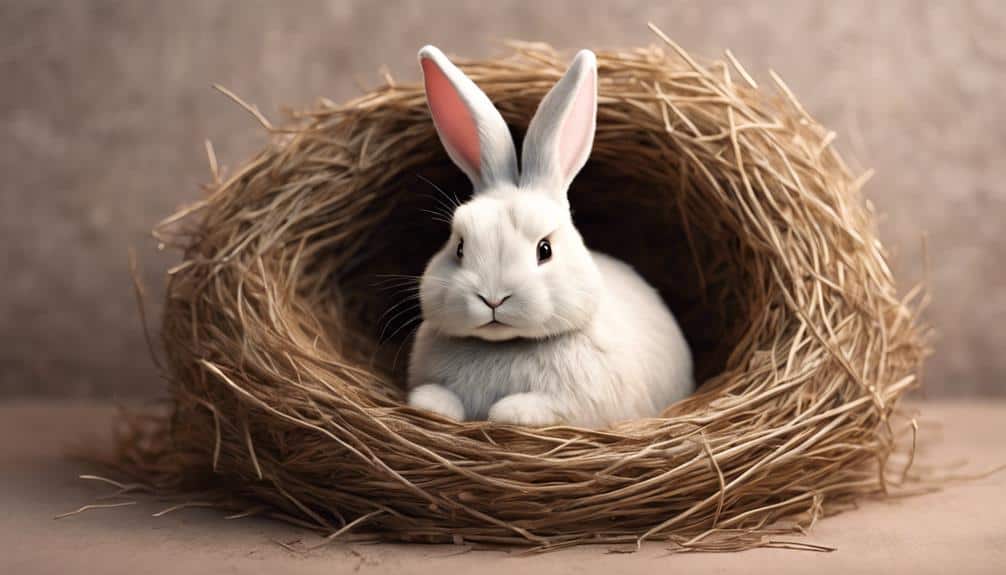
You can recognize signs of bunny pregnancy by observing early pregnancy behaviors such as nesting and fur pulling. Additionally, physical changes like increased appetite and mood swings may indicate a pregnant rabbit.
Nesting and preparation behaviors, including creating a cozy nest with hay, are common signs of impending birth.
Early Pregnancy Behaviors
During early pregnancy in rabbits, observing nest building behavior using hay or straw can provide valuable insight into potential bunny pregnancy. This behavior is a common sign of impending motherhood in rabbits.
Additionally, if you notice the doe pulling fur to create a warm blanket in the nest, it could indicate that birth is imminent. Aggressive behaviors like growling may also be displayed by pregnant rabbits as they become protective of their nesting area.
If you observe defensive behavior towards the nest, it could signal that birth is approaching. Remember, consulting a vet for confirmation of these pregnancy signs is always recommended to make sure the health and well-being of both the doe and her kits.
Physical Changes Noticed
Pregnant rabbits typically exhibit noticeable physical changes, including an enlarged belly due to fetal growth and increased appetite and mood fluctuations. As the pregnancy progresses, you may observe nesting behavior in your bunny, such as piling up bedding in a specific area, indicating she's preparing to give birth. Another common sign is fur pulling, where the pregnant rabbit pulls out her fur to line the nest and create a warm environment for the upcoming kits.
To support your pregnant rabbit during this time, provide a clean nest box filled with hay where she can feel secure and comfortable. These physical changes are important indicators of your rabbit's pregnancy and impending motherhood.
Nesting and Preparation
Upon nearing the end of their gestation period, rabbits typically exhibit nesting behavior characterized by piling up bedding as a clear sign of impending birth. This behavior is essential as the pregnant rabbit prepares for the arrival of her kits. As you observe your rabbit's behaviors, keep an eye out for the following signs to make sure she's ready for birth:
- Fur pulling: Watch for your rabbit pulling fur to create a nest; this is a sure sign of preparation for birth.
- Nest box: Providing a clean nest box filled with hay is important for creating a suitable birthing environment for the upcoming litter.
- Increased appetite and mood changes: These can be indicators that your rabbit is close to giving birth, so be attentive to any changes in behavior.
Bunny Gestation Period Length
When discussing the length of the bunny gestation period, it's essential to note that it typically spans around 31-33 days. Gestation in rabbits refers to the period of fetal development in the mother rabbit before the babies are born.
Female rabbits can conceive as early as 12 weeks of age, so it's important to be aware of the signs of pregnancy to guarantee proper care. It's also worth noting that rabbits can continue reproducing until they're around four years old, emphasizing the importance of considering spaying or neutering to prevent unintended litters.
The final answer for the bunny gestation period is approximately one month, making it a relatively short but crucial time for the mother rabbit and her offspring. Being mindful of this timeframe and understanding the reproductive capabilities of rabbits can help in responsibly managing their breeding and overall well-being.
Preparing for Bunny Birth
To best prepare for the upcoming bunny birth, make sure the nesting area is equipped with a snug nest box filled with hay for the mother to construct her nest.
It's crucial to keep the nesting area clean and provide fresh bedding daily to guarantee a hygienic environment for the mother and babies.
Monitor the mother for signs of impending birth, such as fur pulling, which indicates she's preparing for labor.
Additionally, guarantee the mother has privacy and a quiet environment for giving birth, as stress can negatively impact the birthing process.
If there are any concerns or complications during labor, don't hesitate to consult a vet for professional guidance and assistance.
Caring for Baby Bunnies
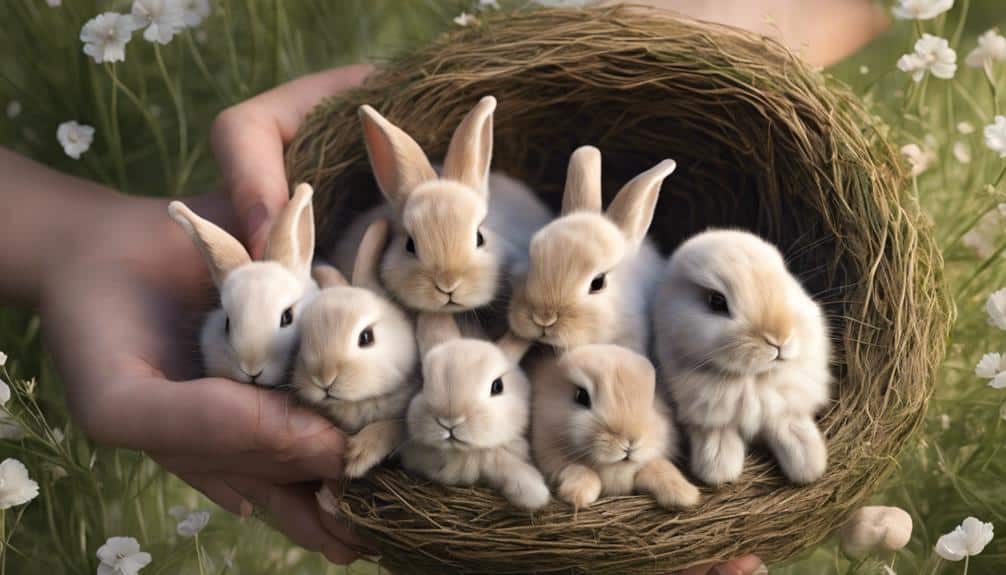
When caring for baby bunnies, you must focus on feeding them with appropriate nutrition, ensuring they're kept warm and sheltered, and monitoring their health closely for any signs of distress.
Baby bunnies rely on a diet rich in nutrients to support their rapid growth, and maintaining a warm, safe environment is essential for their well-being.
Regular health checks are vital to catch any potential issues early and provide the necessary care for their development.
Feeding Baby Bunnies
Feeding baby bunnies is essential for their growth and development, ensuring they receive the necessary nutrients for a healthy start.
When caring for baby bunnies, remember:
- Nursing: Baby bunnies naturally nurse from their mother until being weaned at around 4-5 weeks old.
- Weight Gain: It's important for baby bunnies to gain approximately 1/4 ounce in weight per day for healthy development.
- Bottle Feeding: In rare cases where the mother is absent or unable to nurse, special formula may be needed for bottle-feeding baby bunnies.
Providing Warmth and Shelter
Baby bunnies require a warm and sheltered environment to thrive, making sure their well-being and development. During pregnancy, the female bunny will prepare a nest for her kits. Provide a draft-free nest box with soft bedding like hay or shredded paper.
It's important to maintain the nest box at a comfortable temperature for the kits, around 65-75°F (18-24°C), to keep them warm. Make sure the bedding is clean and dry to prevent any health issues. A cozy and secure shelter is essential for the baby bunnies to feel safe and protected during their early days.
Monitoring Baby Bunny Health
Monitoring the health of baby bunnies involves observing their daily weight gain to guarantee proper development and well-being. When caring for baby bunnies, remember the following:
- Make sure baby bunnies gain about 1/4 ounce per day for healthy growth.
- It's acceptable to handle newborn baby bunnies for necessary health checks.
- In rare cases, consider using a special formula for bottle feeding baby bunnies.
Managing Bunny Reproduction
To effectively manage bunny reproduction, proper separation of unneutered bucks and does is essential to prevent unwanted pregnancies. Female rabbits have a gestation period of 31-33 days, and they can start reproducing as early as 12 weeks old, continuing until they're four years old.
Neutering rabbits is an important step in preventing accidental pregnancies and promoting responsible breeding practices. By monitoring signs of pregnancy, providing suitable nest boxes, and ensuring proper nutrition, you can effectively manage bunny reproduction.
Keeping unneutered males and females apart is key to avoiding unexpected litters. Proper care also involves being vigilant about the breeding potential of rabbits within your care. By taking these steps, you can help maintain the health and well-being of your rabbits while also preventing overpopulation and ensuring responsible breeding practices.
Frequently Asked Questions
Do Rabbits Get Pregnant Every Time They Mate?
When rabbits mate, they can get pregnant each time due to their unique reproductive cycle. Does remain fertile post-birth. Separating does and bucks after mating is important to prevent immediate re-conception. Neutering bucks helps regulate breeding.
How Long Is a House Bunny Pregnant?
During pregnancy, house bunnies exhibit nesting behaviors such as creating cozy nests. They may develop pregnancy cravings for specific foods. Ultrasound images can confirm bunny pregnancies. Proper prenatal care is important for a healthy delivery.
How Do Bunnies Act When Pregnant?
During pregnancy, bunnies may exhibit nesting behavior, food cravings, mood swings, weight gain, and a need for prenatal care. They might also seek bonding with their owner for comfort and security.
How Many Times a Year Is a Rabbit Pregnant?
You might wonder how many times a year a rabbit gets pregnant. Well, due to their rapid reproductive cycle and high fertility rate, a doe can conceive multiple times annually, showcasing their impressive breeding frequency.
Conclusion
Congratulations on successfully maneuvering the intricate process of bunny gestation! Remember, the bunny gestation period may seem like a mere blink of an eye, but the joy and fulfillment that come with welcoming a litter of baby bunnies into the world is truly unparalleled.
Keep providing your does with the utmost care and attention, and watch as they continue to amaze you with their nurturing instincts. The miracle of bunny reproduction truly knows no bounds!


